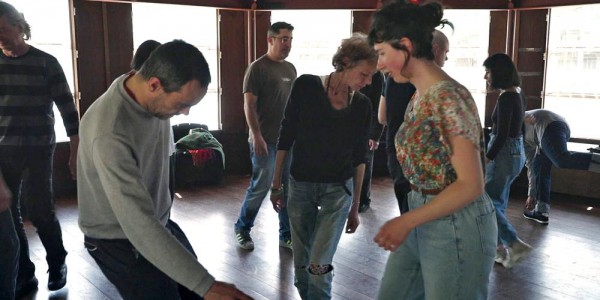NICOLAS PHILIBERT: ON THE ADAMANT/SUR L'ADAMANT (2023) RENDEZ-VOUS WITH FRENCH CINEMA AT LINCOLN CENTER DANCING ON THE ADAMANTTRAILERA BARGE FOR SPECIAL PEOPLE The Adamant
DANCING ON THE ADAMANTTRAILERA BARGE FOR SPECIAL PEOPLE The Adamant is the name of a barge on the banks of the Seine in central Paris that's also a day care facility for neurodivergent adults. That term is used for people on the autism spectrum, but the net is cast wider. Some of the people we hear from in Nicolas Philibert's new documentary speak plainly of long having been mentally ill, and more than one says that without their meds they would not function at all.
So that may be one of the problems of this engaging and loosely slung film (at least one of the people speaks of his connection with the Sixties and Seventies and we hear original musical compositions, one song, and see a lot of painting and drawing being done): we don't know enough about who these people are. What
is the "spectrum" of people who spend time here? This is a vagueness that makes the film different from Philibert's wonderful and most famous one, the deeply touching 2002
To Be and To Have/Être et avoir, about a year at a tiny grade school in in rural Issoire, in the center of France, with a single, loving teacher; or the 2010
Nénette, about a world-weary 40-year-old imprisoned orangutan, first from the visitors' point of view, then from his.
What comes through is Phlibert's special kindness and patience, simply in the way his camera and his microphone listens to the unheard and sees the unseen. The thing that's different about the
Adamant, someone says, is that the people come here of their own free will. The visitors have evidently dealt with medical facilities all their lives, institutions. Here they come more for enjoyment and participation a meal, a good cup of coffee, to hang out. As the blurb says, it's "a haven of community and caretaking." There are somewhat mysterious sessions at doing accounts, not much fun, but no doubt useful. There is a film group, which holds discussions. There are the opportunities to play keyboard music or the guitar or to dance. There are the drawing sessions, though one discussion of a painting shows the usual pointless external comments, perhaps from a nurse or other consultant - but no worse than you'd probably get in any art class!
In the middle of a world of mental institutions, Philibert has found a forgiving, even fun place. And he reminds us at the outset and the finale that it's made of shuttered wood, looks rather spiffy, and is on the Seine. This may not be one of the director's best films, but it could be an eye-opener for many, a view of how institutions for the mentally "different" could be softened and warmed.
However casual-seeming,Life on the
Adamant nonetheless not without limits. When one 'visitor' who says she has been coming for years makes a lengthy and rambling appeal to be allowed to 'teach' a dance class, a young employee says inmates being given teaching jobs is not a policy of the place.
There is the gentleness, but perhaps not as much intimate attention as
To Be and to Have. Philibert's 2013 film about he French government
House of Radio similarly was attentive, but somehow failed to pull things together, to orient us. But he's still a great documentary flmmaker.
On the Adamant/Sur l'adamant, 109 mins. debuted at the Berlinale Feb. 24, 2023, where it was awarded the Golden Bear, and opening theatrically in France Apr. 19, 2023, receiving a César nomination and AlloCiné ratings of 4.2 (84% for the press and 3.9 (78%) from spectators. A US Kino Lorber release.
Screened for this review as part of the Rendez-Vous with French Cinema at Lincoln Center, New York (Feb. 29-Mar. 10, 2024. Showtimes:
Monday, March 4 at 6:00pm (Q&A with Nicolas Philibert)
Friday, March 8 at 3:45pmThis important documentary, which besides the Golden Bear at Berlin has won numerous other international awards,will be opened by Kino Lorber in New York on March 29th. Other cities will follow.





